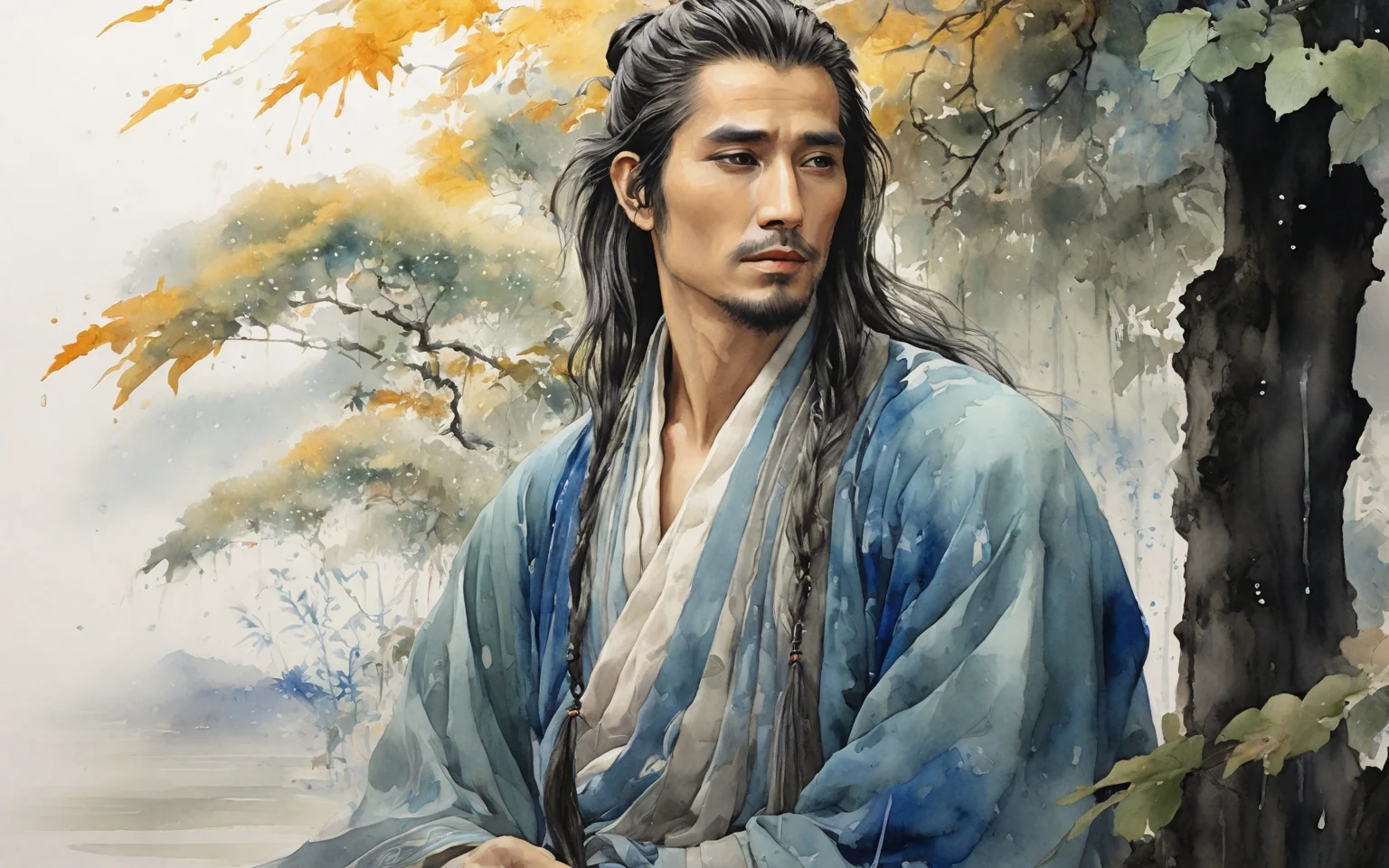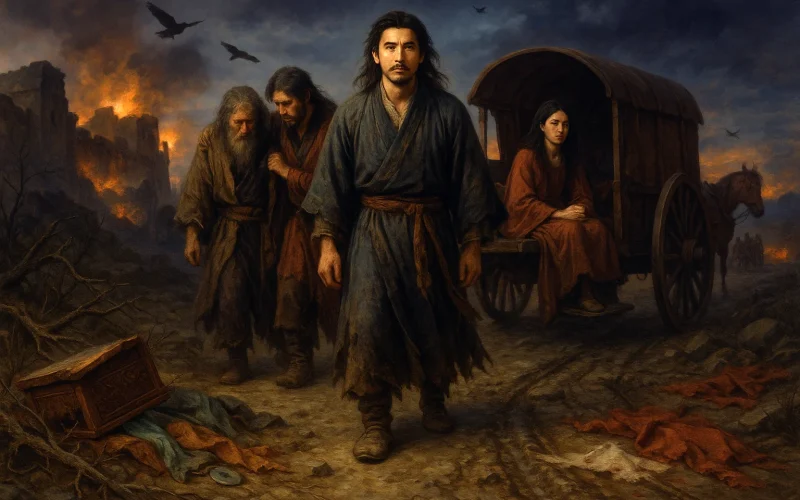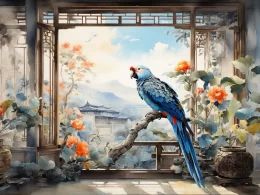Along the wall of the Capital a white-headed crow
Flies to the Gate where Autumn Enters and screams there in the night,
Then turns again and pecks among the roofs of a tall mansion
Whose lord, a mighty mandarin, has fled before the Tartars,
With his golden whip now broken, his nine war-horses dead
And his own flesh and bone scattered to the winds....
There's a rare ring of green coral underneath the vest
Of a Prince at a street-corner, bitterly sobbing,
Who has to give a false name to anyone who asks him-
Just a poor fellow, hoping for employment.
A hundred days' hiding in grasses and thorns
Show on his body from head to foot.
But, since their first Emperor, all with hooknoses,
These Dragons look different from ordinary men.
Wolves are in the palace now and Dragons are lost in the desert --
O Prince, be very careful of your most sacred person!
I dare not address you long, here by the open road,
Nor even to stand beside you for more than these few moments.
Last night with the spring-wind there came a smell of blood;
The old Capital is full of camels from the east.
Our northern warriors are sound enough of body and of hand --
Oh, why so brave in olden times and so craven now?
Our Emperor, we hear, has given his son the throne
And the southern border-chieftains are loyally inclined
And the Huamen and Limian tribes are gathering to avenge us.
But still be careful-keep yourself well hidden from the dagger.
Unhappy Prince, I beg you, be constantly on guard --
Till power blow to your aid from the Five Imperial Tombs.
Original Poem:
「哀王孙」
杜甫
长安城头头白乌,夜飞延秋门上呼。
又向人家啄大屋,屋底达官走避胡。
金鞭断折九马死,骨肉不待同驰驱。
腰下宝玦青珊瑚,可怜王孙泣路隅。
问之不肯道姓名,但道困苦乞为奴。
已经百日窜荆棘,身上无有完肌肤。
高帝子孙尽隆准,龙种自与常人殊。
豺狼在邑龙在野,王孙善保千金躯。
不敢长语临交衢,且为王孙立斯须。
昨夜东风吹血腥,东来橐驼满旧都。
朔方健儿好身手,昔何勇锐今何愚。
窃闻天子已传位,圣德北服南单于。
花门剺面请雪耻,慎勿出口他人狙。
哀哉王孙慎勿疏,五陵佳气无时无。
Interpretation:
In 756 AD, the An Lushan Rebellion broke out, forcing Emperor Xuanzong of Tang to flee in panic while Chang'an fell into enemy hands. The following spring, Du Fu was captured by the rebel forces and personally witnessed the devastation wrought by war. This poem was written during that period, centering on the tragic fate of a noble descendant. Through his suffering, the poet vividly portrays the displacement of the aristocracy and the desolation of Chang’an after its fall. The poem expresses both deep sympathy for the noble youth and implicit criticism and admonition for the rulers of the Tang dynasty.
First Couplet: “长安城头头白乌,夜飞延秋门上呼。”
On the walls of Chang’an, a white-headed crow perches; at night, it flies to the Yanqiu Gate, crying mournfully.
The white-headed crow, often seen as a symbol of death and misfortune, circles over Chang’an as if lamenting the city’s decline and suffering.
Second Couplet: “又向人家啄大屋,屋底达官走避胡。”
It pecks at the grand mansions, yet inside, former high-ranking officials flee in terror from the barbarians.
Once-glorious residences have become places of disaster, with scavengers feasting on their ruins. Meanwhile, the powerful elites now flee in disgrace, underscoring the ruthless nature of war.
Third Couplet: “金鞭断折九马死,骨肉不待同驰驱。”
In their frantic escape, golden whips are snapped, nine fine horses collapse, and even close kin cannot flee together.
The wealthy, once living in luxury, now face separation and death, revealing the cruel impermanence of human fate.
Fourth Couplet: “腰下宝玦青珊瑚,可怜王孙泣路隅。”
The noble youth still wears a jade pendant adorned with coral, yet he weeps helplessly on the roadside.
His attire still reflects past wealth, but reality has crushed him—he is now nothing more than a helpless, homeless orphan.
Fifth Couplet: “问之不肯道姓名,但道困苦乞为奴。”
Asked for his name, he dares not say it, speaking only of his suffering, willing even to become a slave to survive.
Even someone of noble descent is reduced to such a pitiful state, too fearful to reveal his identity—his only wish is to live.
Sixth Couplet: “已经百日窜荆棘,身上无有完肌肤。”
For a hundred days, he has fled through thorny fields, his body left without a patch of unscarred skin.
Once accustomed to comfort, he now endures hardship, struggling for survival in the wilderness—a stark contrast to his past life.
Seventh Couplet: “高帝子孙尽隆准,龙种自与常人殊。”
The descendants of the great emperor all bear the noble features, for imperial blood is unlike that of common folk.
This line reflects the traditional belief in the divine nature of the royal bloodline, yet in the face of war, it becomes ironic—his noble heritage does not shield him from suffering.
Eighth Couplet: “豺狼在邑龙在野,王孙善保千金躯。”
The city is overrun by jackals and wolves, while the royal lineage roams in exile—O noble youth, take care to protect your life.
The rebels, likened to wild beasts, have taken over, while the rightful rulers are displaced. The poet urges the noble youth to survive and await restoration.
Ninth Couplet: “不敢长语临交衢,且为王孙立斯须。”
In these troubled streets, I dare not speak for long; I can only stand with the noble youth for a brief moment.
In times of chaos, fear prevails, and even companionship must be fleeting.
Tenth Couplet: “昨夜东风吹血腥,东来橐驼满旧都。”
Last night, the east wind carried the stench of blood, as camel-riding barbarians filled the fallen capital.
The east wind, typically a symbol of spring, now carries a sinister scent, emphasizing the horror of war. The sight of foreign invaders in Chang’an reinforces the city’s tragic fall.
Eleventh Couplet: “朔方健儿好身手,昔何勇锐今何愚。”
Once, the warriors of Shuofang were famed for their strength—how could they now be so powerless?
The poet questions how the once-mighty frontier troops failed to suppress the rebellion, expressing frustration at the empire’s military decline.
Twelfth Couplet: “窃闻天子已传位,圣德北服南单于。”
I hear the Son of Heaven has abdicated, and his divine virtue now commands the submission of northern and southern tribes.
The poet acknowledges the new emperor’s reign, hinting at hope for stability, yet the tone remains uncertain.
Thirteenth Couplet: “花门剺面请雪耻,慎勿出口他人狙。”
At the frontier pass, warriors scar their faces, vowing revenge—yet this must remain a secret, lest spies betray us.
Loyal soldiers remain determined to reclaim lost glory, but the poet warns of traitors, urging caution.
Fourteenth Couplet: “哀哉王孙慎勿疏,五陵佳气无时无。”
Alas, noble youth, do not lose hope—for the imperial spirit of the Five Mausoleums shall never fade.
By invoking the royal tombs, the poet reassures the noble youth that the dynasty’s fate is not yet sealed, subtly expressing hope for the empire’s resurgence.
Overall Analysis
This poem vividly portrays the downfall of the aristocracy during the An Lushan Rebellion through the tragic fate of a noble youth. It opens with the ominous imagery of a white-headed crow, setting a sorrowful tone. As the poem unfolds, it contrasts the noble’s former glory with his present destitution, simultaneously evoking sympathy and subtly criticizing the Tang rulers. The poet not only reflects on the social turmoil caused by war but also expresses a yearning for the restoration of the dynasty. Ending with a reference to the "spirit of the Five Mausoleums," the poem, though filled with lamentation, retains a sliver of hope.
Writing Techniques
- Contrast: The stark juxtaposition of the noble’s past and present highlights the brutality of war and deepens the tragedy.
- Symbolic Imagery: The crow, the blood-scented wind, and the foreign camels all reinforce the devastation of Chang’an.
- Plain yet Powerful Language: Using a straightforward narrative style, the poet captures the raw reality of war’s destruction, making the poem emotionally impactful.
- Implicit Criticism: While sympathizing with the noble youth, the poet also indirectly critiques the failures of the Tang government and its military.
Insights
This poem reveals the profound impact of war on all social classes, demonstrating that even the nobility cannot escape suffering in times of chaos. Through the noble youth’s plight, the poet underscores the tragedy of a war-torn nation, where survival becomes the sole concern. At the same time, the poem serves as a warning to those in power: indulgence in comfort will inevitably lead to downfall if vigilance is lost. Yet, despite the despair, the poem also carries a glimmer of hope, suggesting that even in the darkest times, faith in renewal must not waver. This deep sense of national concern and historical reflection endows the poem with timeless significance.
Poem translator:
Kiang Kanghu
About the poet

Du Fu (杜甫), 712 - 770 AD, was a great poet of the Tang Dynasty, known as the "Sage of Poetry". Born into a declining bureaucratic family, Du Fu had a rough life, and his turbulent and dislocated life made him keenly aware of the plight of the masses. Therefore, his poems were always closely related to the current affairs, reflecting the social life of that era in a more comprehensive way, with profound thoughts and a broad realm. In his poetic art, he was able to combine many styles, forming a unique style of "profound and thick", and becoming a great realist poet in the history of China.












